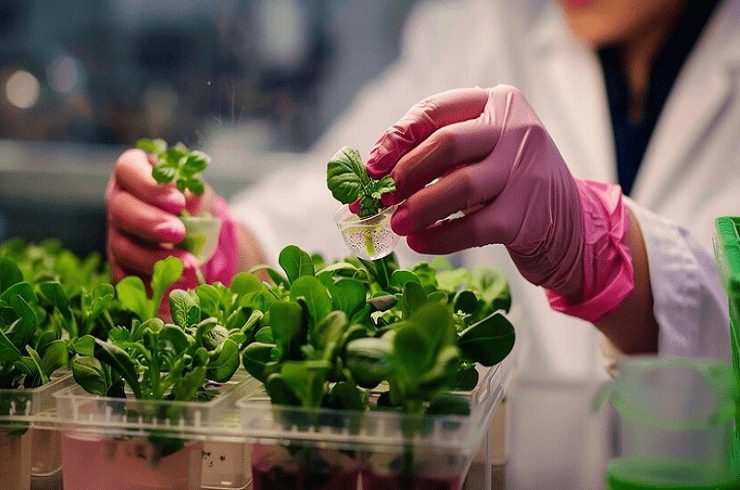Comprehensive Curriculum for MSc in Agriculture 🌾🎓
The Master of Science in Agriculture (MSc Agriculture) is a two-year postgraduate program designed to deepen knowledge and skills in advanced agricultural practices, research methodologies, and agri-innovation. It prepares students for leadership roles in agriculture, agribusiness, research, and policymaking.
Program Overview
The MSc Agriculture program emphasizes research-driven learning in specialized areas like agronomy, soil science, plant breeding, biotechnology, and sustainable agriculture. It integrates theoretical study with fieldwork and lab research to address modern challenges in agriculture and food security.
Eligibility Criteria
- Educational Qualification:
- A BSc in Agriculture or a related field (e.g., Horticulture, Forestry, Agricultural Engineering).
- Minimum aggregate score of 50%-60% (relaxations for reserved categories).
- Entrance Exams:
- ICAR AIEEA PG (for central agricultural universities).
- University-specific entrance exams like TNAU PG Exam, GBPUAT, etc.
- Work Experience (optional):
- Some institutions prefer applicants with prior work or research experience in agriculture.
- English Proficiency (for international applicants):
- Valid scores in TOEFL, IELTS, or equivalent tests.
Admission Procedure
- Application Process 📝:
- Submit an online or offline application form along with academic transcripts, proof of identity, and photos.
- Entrance Exam :
- Appear for relevant national or university-level entrance exams.
- Counseling/Interview:
- Shortlisted candidates may have to participate in a counseling session or personal interview.
- Final Selection:
- Based on entrance scores, academic merit, and performance in the interview (if applicable).
Curriculum Structure
Year 1: Core Agricultural Sciences
- Compulsory Subjects:
- Advanced Agronomy
- Crop Physiology and Biochemistry
- Plant Pathology and Disease Management
- Soil Chemistry and Fertility Management
- Agricultural Economics and Policy
- Practical Courses:
- Advanced Laboratory Techniques
- Field Trials and Crop Simulation Studies
Year 2: Specialization and Research
- Specialization Options:
- Agronomy and Soil Science
- Plant Breeding and Genetics
- Horticulture and Post-Harvest Technology
- Agri-Biotechnology and Genetic Engineering
- Agricultural Business Management
- Research and Dissertation:
- Conduct independent research on a chosen topic under faculty guidance.
- Internship and Training:
- Mandatory internships with research institutions, agribusiness firms, or NGOs.
Assessment & Grading
- Continuous Assessment: Through assignments, seminars, and lab work.
- Final Exams: Written and practical exams at the end of each semester.
- Thesis Evaluation: Based on quality of research, presentation, and defense.
Career Options After MSc in Agriculture 🌟
In India
- Research and Academia:
- Work as an Agricultural Scientist at ICAR, CSIR, or state universities.
- Lecturer or professor in agricultural colleges.
- Government Sector:
- Agricultural Extension Officer.
- Roles in NABARD, FCI, or Ministry of Agriculture.
- Private Sector:
- Research and Development roles in seed companies, agrochemical firms, or food processing industries.
- Agri-tech companies working on precision farming or drone technology.
- Entrepreneurship:
- Start agribusiness ventures in organic farming, agri-tourism, or agri-consulting.
Abroad Opportunities 🌍
- Higher Studies:
- PhD in Agricultural Sciences or related fields.
- Specialized certifications in areas like plant genetics or sustainable farming.
- International Organizations:
- Work with FAO, CGIAR, or international NGOs on global agricultural projects.
- Global Agribusiness:
- Join multinational companies involved in food production, supply chain, or export.
Competitive Exams After MSc Agriculture 🏆
In India
- ICAR JRF/SRF: For PhD admissions and research fellowships.
- UPSC Exams:
- Indian Forest Service (IFS).
- Civil Services Exam (e.g., IAS, IPS).
- State Public Service Exams: Agricultural Officer roles in state departments.
- Banking Sector Exams:
- IBPS SO (Agriculture Field Officer) for roles in rural banking.
Abroad
- GRE/GMAT: For doctoral programs or MBA in Agribusiness.
- TOEFL/IELTS: For language proficiency in global education or employment.
- Professional Certifications: In precision farming, agri-supply chain, or organic agriculture.
Program Fee Structure
- India: ₹50,000 – ₹1,50,000 per year.
- Abroad: $10,000 – $30,000 per year.
(Scholarships, fellowships, and fee waivers are often available for meritorious students.)
Conclusion
The MSc in Agriculture equips students with advanced knowledge and technical expertise to address global agricultural challenges. 🌟 Graduates can contribute to sustainable farming, food security, and agribusiness innovation while pursuing rewarding careers in India or internationally.
Course Features
- Lecture 0
- Quiz 0
- Duration 156 weeks
- Skill level All levels
- Language English
- Students 0
- Assessments Yes







